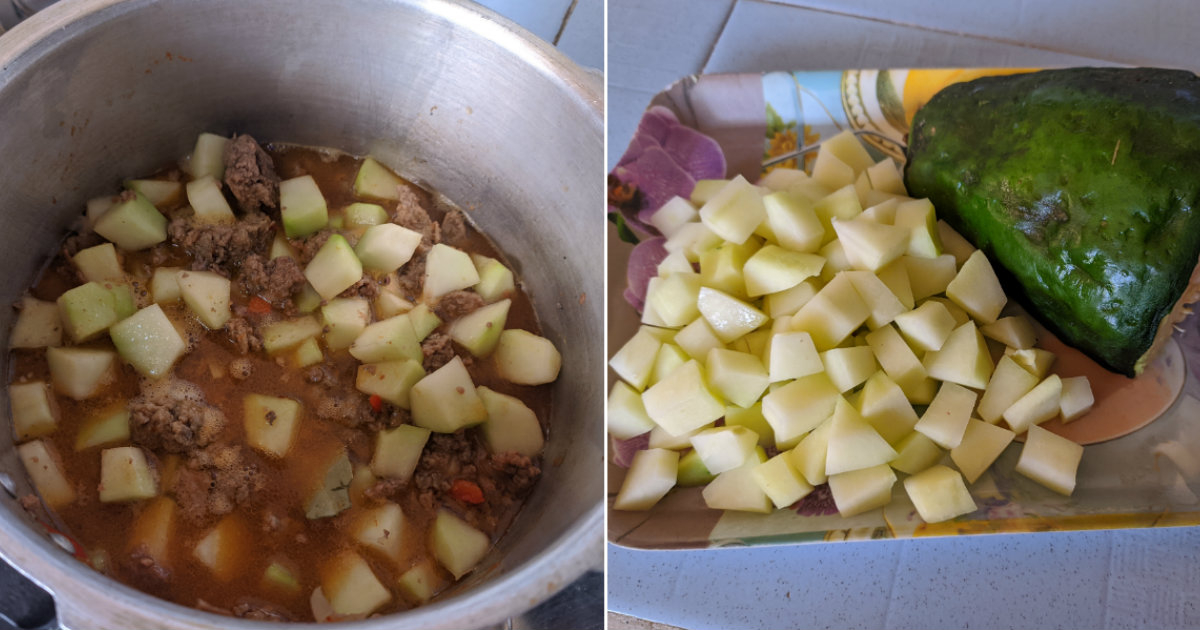
The creative ingenuity of Cubans, an ancestral characteristic that has accompanied those born on the island inlean times, returns these days to the city of Santiago de Cuba when, in the traditional absence of the potato, the tuber is replaced by green bomb fruit that is present in the city's markets.
The jokingly called "new potato from Santiago" replaces the famous root in dishes where it is combined with meat, in a cold salad, with eggs, vegetables, with fish and is even fried, just as it is done with the tuber that in this city is imported from other provinces, hence its traditional shortage.
María Caridad, a resident of Veguita de Galo, says that in her case it all started when a couple of months ago they sold her a module with a couple of green fruit bombs and she no longer had any of the potatoes that were sold at the beginning of social isolation.
“A neighbor told me that the green bomb fruit could be used, after being boiled or spent in the pressure cooker for a while, combined with meat or in other forms. The truth is that I was skeptical, it seemed to me that it wasn't going to taste good, but I did it in the end, there was no other option, more than curiosity it was necessity, and the truth is that combined withPork Meat, for example, is not bad.”
But the inventiveness of this Santiago native does not stop there. After a successful first of green fruit bomb and pork, he then combined it with a homemade pasta, based on rice and concentrated chicken-flavored broth, and made a delicious cold salad, he also combined it with vegetables.
"They say that it is also very delicious in sauce, just as if you cooked potatoes in sauce, you can also make a delicious salad with boiled eggs. The other day someone in a queue to buy detergent was talking about how you could boil it and make a puree, which Butter, milk or lard is added, which was made the same as if it were potatoes. Some say that it can be fried and even peeled and cooked in the oven as if it were potatoes. All of these are recipes that I have not tried yet, but if things continue this bad, I will have no choice but to try and who knows, maybe those recipes will not be so bad," he says.
María Caridad remembers that in the so-called Special Period, or at least in the hard years of the 90s, she also had to invent everything: “never before has there been more magic in the kitchen, I had to make bean candy and “sopinguete.” , a type of soft bean in which rice, corn flour and whatever food was added, this was eaten like this, a type of sancocho similar to a broth or ajiaco but without being one. I know of people who did cook picadillo from plate peel, they fried grapefruit peel..., I did not make either of these two inventions, but I heard that there were people who did."
The presence of some products that until a couple of weeks ago were declared absent on the Santiago de Cuba table leads us to believe that the shortage in the city of Santiago de Cuba is beginning to ease a few millimeters. However, what does not seem to give any signs of relief are the very high prices that speak of another type of scarcity: that of seeing and not being able to buy.
Pork these days reaches 50 pesos per pound, beans are sold at 10 and 15 pesos per package, pumpkin at 13 pesos per pound, a hand of donkey banana is sold for up to 20 pesos per pound. taro at 25 pesos, cassava at 15 pesos per pound, and a very few coriander leaves in a small package that sells for five pesos; prices that a few years ago seemed unreal and today are part of the harshest and harshest reality.
What do you think?
COMMENTFiled in: